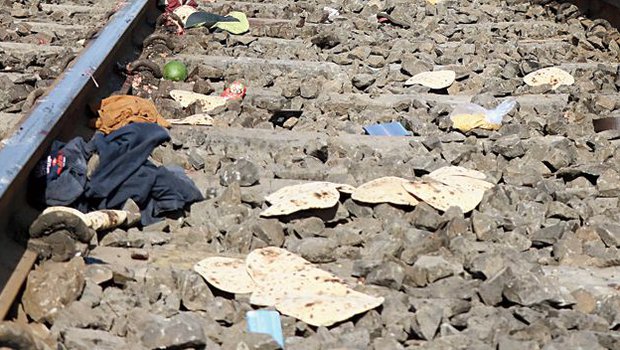
A bunch of jhulsa roties scattered over thickly layered ballast, bracketed by pairs of iron rail tracks and sleepers, bitterly mocked the apathy of some of us who rushed to our terraces the previous night, of Buddha Purnima, to appreciate the pockmarked beauty of the full moon. The image marked the acme of the sadistic drama so horrendously enacted in the theatre of macabre since the inauguration of the nationwide lockdown on 25th March, 2020. While the well-fed and the well-bred, got down to make the best use of the windfall staycation, for honing professional skills, fulfilling neglected hobbies, binge-watching movies, online series, televised epics or simply accepting or giving social media challenges, the tragic heroes of this tragi-comedy turned out to be the lakhs and lakhs of migrant workers who, left to their own wretched lot by everyone one can think of, set out Buddha-like on mahabhinishkramana (the great departure), however not away from but towards their homes in rural India. The visuals of the horrors inflicted on them as they trudged hundreds of kilometres along highways, fields, and canals, luggage and children in tow, under the blazing sun flooded our touch and television screens. Hearts of a few reached out to them, others complained about why on earth they are leaving and not following the norms of “social distancing”, a horrible term we still don’t mind using. Scores of them died on road of starvation, dehydration, medical conditions and police brutality as our binge-watching among other absurdities went on. We ate, slept and mated as if nothing was amiss. Then, in the wee hours of a fateful morning, sixteen migrants, working ironically in an iron factory in Jalna and on their way to Bhusawal to catch the “shramik special” train, get run over by a goods train leaving behind images that promise to haunt the conscience of the nation for decades on end.
Questions about how and why they slept on the tracks gave away a couple of things about the kind of a society we’ve become. First, we don’t have the experiential resources or karuna to figure out what it would have taken for them to decide to sleep on tracks. Secondly, it exposes our intellectual poverty to construct a right kind of question or response to this heart-rending tragedy. Prior to them, it’s we who decided to walk away from the uncomfortable existential realities of a nation divided between India and Bharat. Prior to their fatigue-induced sleep, it’s we who decided to sleep in our cosy cocoons like dead. Our collective suicide is a necessary precondition to their tragic deaths. Umaria, a home that beckoned some of the deceased, is a district in Madhya Pradesh, known for its highest density of tiger population. It stands in shameful contrast to our fortified homes, we’ve so sheepishly confined ourselves in, scared stiff of a bloody virus. No wonder, in the game of tigers and sheep, retribution has finally caught up with us for our sins of omission and commission. How I wish it wouldn’t but the pitch-dark that pervades the poem is here to stay. This poem, one of the series on this theme, is an act of being a painful witness to a catastrophe that has smudged the line between the real and the surreal.
A poem, pitch-dark
Dhansingh Gond Nirvesh Singh Gond Buddharaj Singh Gond Achchelal Singh
Rabendra Singh Gond Suresh Singh Kaul Rajbohram Paras Singh Deepak Singh
Virendra Singh Chainsingh Pradeep Singh Gond Santosh Napit Brijesh Bheyadin
Munimsingh Shivratan Singh Shridayal Singh Nemshah Singh Dharmendra
Singh Gond1
Footnote:
1.
full-moon night of pitch-dark
fly your moon
at half-mast
a clutch of lamps, spurred by goads,
trudge along the spine of black wicks
screech owls overhead wail monodies
as they head for Umaria
blazing like a flame on a burnt wick breathing its last
beaming like tiger’s eyes behind the burning forests of dark
homes set sail on shimmering mirage, draw closer,
tracing their way from Umaria
look, how they lie flat on a winding bier
cry, claw your face, beat your breasts
give the names
let time step back, directions drop dead
raise the flame
distilled night’s chalice of black opium,
drinks the new dawn, dazzling noon
the gathering evening under heavy eyes
all of them lie on their sides, sleep tight,
facing a wall
dream of a crowd fast asleep on its side
facing a wall
dreaming of teeming sleeping crowds, on their sides,
facing walls,
eyes soar on flowing winds of walls
break seven-circle formation of a great war
it’s time to walk through eons
grant sleeplessness
it’s time to plumb the earth’s depths
grant hunger, bottomless
roads beset with scorpion’s pincers
surge with muffled voices, locked with balls and chains,
rough hands to train, is all they have
-the black leg coils on ashen mountains
greener than venom, blacker than black
let the monkey sleaze-dance in grandstand-
kiss now, kiss the stung hands,
smell the pages of day and night,
pore over the trail of travelogue
like a siren wail, like a foghorn hoot,
be a black murderous cry to boot
soar and thread the horizons in noose
break the settled rhythm of the earth
city of the shocked, city of the balked, will hang its phantom head,
have hope
the last tear that didn’t drop will balloon and smudge borders
salvage, save
full-moon night of pitch-dark
fill empty hands with four moons
fill the overflowing void with insurmountable grief
fill my words stuck on tracks with passion of rubies
full-moon night of pitch-dark
fly your moon
at half-mast




